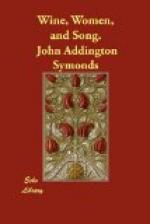Lo! my frailties I’ve
betrayed,
Shown you every
token,
Told you what your servitors
Have against me
spoken;
But of those men each and
all
Leave their sins
unspoken,
Though they play, enjoy to-day,
Scorn their pledges
broken.
Now within the audience-room
Of this blessed
prelate,
Sent to hunt out vice, and
from
Hearts of men
expel it;
Let him rise, nor spare the
bard,
Cast at him a
pellet;
He whose heart knows not crime’s
smart,
Show my sin and
tell it!
I have uttered openly
All I knew that
shamed me,
And have spued the poison
forth
That so long defamed
me;
Of my old ways I repent,
New life hath
reclaimed me;
God beholds the heart—’twas
man
Viewed the face
and blamed me.
Goodness now hath won my love,
I am wroth with
vices;
Made a new man in my mind,
Lo, my soul arises!
Like a babe new milk I drink—
Milk for me suffices,
Lest my heart should longer
be
Filled with vain
devices.
Thou Elect of fair Cologne,
Listen to my pleading!
Spurn not thou the penitent;
See, his heart
is bleeding!
Give me penance! what is due
For my faults
exceeding
I will bear with willing cheer,
All thy precepts
heeding.
Lo, the lion, king of beasts,
Spares the meek
and lowly;
Toward submissive creatures
he
Tames his anger
wholly.
Do the like, ye powers of
earth,
Temporal and holy!
Bitterness is more than’s
right
When ’tis
bitter solely.
XIV.
Having been introduced to the worshipful order of vagrants both in their collective and in their personal capacity, we will now follow them to the woods and fields in spring. It was here that they sought love-adventures and took pastime after the restraints of winter.
The spring-songs are all, in the truest sense of the word, lieder—lyrics for music. Their affinities of form and rhythm are less with ecclesiastical verse than with the poetry of the Minnesinger and the Troubadour. Sometimes we are reminded of the French pastourelle, sometimes of the rustic ditty, with its monotonous refrain.
The exhilaration of the season which they breathe has something of the freshness of a lark’s song, something at times of the richness of the nightingale’s lament. The defect of the species may be indicated in a single phrase. It is a tedious reiteration of commonplaces in the opening stanzas. Here, however, is a lark-song.
WELCOME TO SPRING.
No. 6.




